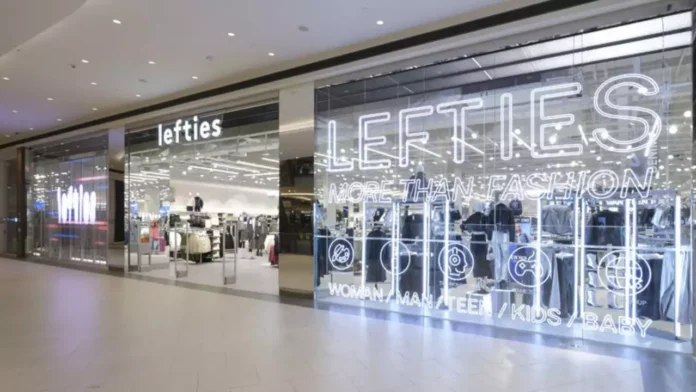Inditex, the parent company of Zara and the largest publicly traded fast fashion corporation globally, is expanding its budget-friendly brand, Lefties, targeting Generation Z, in response to competition from Shein, a fast-growing Chinese-founded competitor.
Shein’s rapid expansion as an online marketplace devoid of physical stores is compelling retailers such as Inditex and Sweden’s H&M to seek strategies to counter its competitive pricing. Zara’s pricing competitiveness has waned as Inditex raised prices within its core brand to safeguard profit margins amidst inflation and to cater more to upscale clientele. Nonetheless, the Spanish company is discreetly expanding its budget offerings.
The expansion of Lefties, offering jeans priced at 17.99 euros, dresses for as low as 7.99 euros ($8.64), and handbags at 5.99 euros, is a key component of that strategy.
Initially serving as an outlet for Zara’s surplus items, Lefties has now expanded its presence to 17 countries, including Egypt, Mexico, Romania, Saudi Arabia, Turkey, and the United Arab Emirates.
Its expansion demonstrates Inditex’s desire to establish a presence in the lower-priced segment of the market, even as it continues to enhance profitability at Zara, a brand significantly larger than Lefties in terms of both sales and store count.
Lefties is expanding both in its domestic market of Spain and in Portugal, particularly as many consumers are opting for more budget-friendly options amidst pressure from Shein’s extremely low prices. In Spain, where Lefties boasts 25 stores according to its website, its customer base has surged from approximately 3.5 million in 2019 to 5 million in 2023, trailing just behind Shein, estimated at 5.2 million, according to figures from market research firm Kantar.
Continue Exploring: H&M bets big on glamour to rebuild profit margins amidst growing competition from Shein
Swetha Ramachandran, a portfolio manager at Artemis Fund Managers in London, whose fund invests in Inditex, suggests that Lefties’ expansion into various emerging markets indicates a strategy by Inditex to cater to shoppers who might be less inclined to spend extravagantly at Zara.
Ramachandran further mentioned that discussions with Inditex management frequently revolve around Shein’s influence on the fast fashion sector and the most effective strategies for Inditex to counter it. According to Coresight Research, Shein, although unlisted, holds the title of the world’s largest fast-fashion retailer, boasting an estimated 18% market share.
On Instagram and TikTok, Lefties employs similar tactics to Shein, often featuring micro-influencers in the majority of its posts, contrasting with Zara’s social media marketing, which tends to lean towards a high-fashion aesthetic.
Lefties remains consolidated under Zara within Inditex’s financial reports, thereby keeping its results undisclosed to the public.
Inditex refrained from providing answers to inquiries regarding Lefties’ sales and strategy. Instead, the company emphasized that the brand has been autonomously curating collections for women, men, and children for over twenty years.
“We don’t have much visibility on it but I think it is working wonders because it is the only one in the low-cost segment with a good online service,” said Patricia Cifuentes, senior analyst at Bestinver Securities.
In Spain, competitor Primark does not provide home delivery services, and Shein typically takes 10 to 12 days to fulfill orders, according to Cifuentes. This situation positions Lefties as a more appealing option. Cifuentes noted that Inditex is strategically maintaining confidentiality regarding the brand’s performance while patiently assessing its trajectory.
“It typically takes time for a retailer to reach the critical mass and, therefore, the right profitability. Moreover, there is an advantage in keeping the results hidden from the competitors for the time being,” she said.
According to Kantar estimates, Shein’s customer base in Spain surged to 5.2 million in 2023 from 421,000 five years prior. However, the Chinese retailer still lags significantly behind Zara and Primark in terms of market presence.
When questioned about Lefties, Shein declined to provide commentary on other companies. Instead, the retailer announced plans to launch “several” pop-up stores across Europe this year, following last year’s successful pop-ups in cities such as Berlin, London, Paris, and Rome.
Continue Exploring: Shein investors offer shares at 30% discount amid dwindling IPO prospects
Primark declined to provide comments regarding competitors.
According to unpublished Kantar estimates, Lefties in Portugal attracted a larger number of shoppers than Zara last year.
“The competitor set is still quite formidable for the very low price point,” said Grace Su, San Francisco-based portfolio manager at Clearbridge Investments, whose fund holds shares in Inditex.
“If they can drive a business with adequate returns, it’s all accretive as long as it’s not cannibalising the rest of the brands.”
Last year saw Lefties opening its first stores in Romania and Turkey, along with expanding its presence in the United Arab Emirates through franchise partnerships.
Despite this, Zara and other Inditex brands such as Bershka and Pull&Bear have been reducing their global store count. As of October 31, 2023, Inditex had 585 fewer stores compared to the previous year.
Similar to Zara, Lefties in Spain concentrates on establishing large stores in major cities. Its largest flagship store was unveiled in Madrid towards the conclusion of 2022.
“This is the first time we have shopped here,” said 47-year-old Diana Doina, waiting to pay at the Lefties store in Madrid with her 13-year-old daughter Carla. “I’ll take some cargo trousers, and the trainers are really cheap.”





